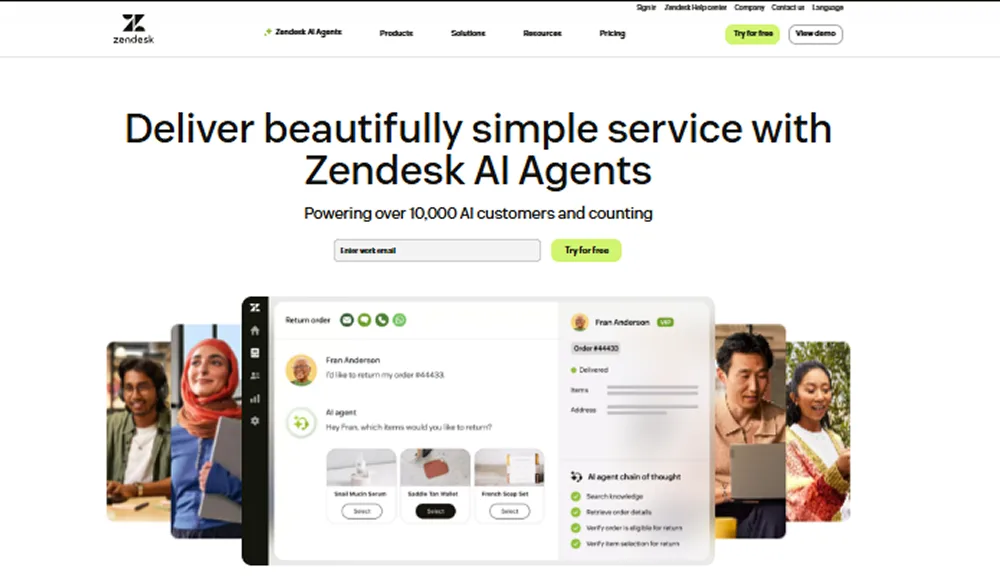Zendesk(Customer Support) Overview & 2026 Industry Position
Zendesk(Customer Support) continues to dominate the customer experience software space with a feature-rich, AI-enhanced platform built for scalability. Founded on the philosophy of simplifying support conversations, Zendesk has evolved into a robust omnichannel suite that powers businesses of every size—from emerging startups to Fortune 500 enterprises. In 2026, its strategic focus centers on intelligent automation, CRM unification, and modular solutions designed to minimize agent workload while maximizing customer satisfaction.
From Launch to 2026: Zendesk(Customer Support)’s Journey
Established in 2007 in Copenhagen, Zendesk initially won hearts with its minimalist support ticket system. In 2014, it went public on the NYSE boosting global confidence. Milestones include:
- 2016: Introduced Zendesk Support Suite for multichannel unification
- 2018: Rolled out Answer Bot—its first machine learning tool
- 2020: Launched Sunshine CRM platform architecture
- 2022: Acquired by private equity for $10.2B to accelerate innovation
- 2024: Released Zendesk AI for CX, marking a new era in self-service and automation
Zendesk’s 2025 thesis: Transform from support system to AI-first customer experience operating system.

Zendesk(Customer Support) Key Features
In July 2026, Zendesk(Customer Support) includes the following standout functionalities:
- AI-Powered Automation: AI flows, routing, bot assistance, and sentiment detection
- Unified Agent Workspace: View all channels—chat, email, social, voice—in a single console
- CRM Integration: Sunshine Platform flexibility for data relationships & workflows
- Advanced Analytics: Real-time dashboards, SLA tracking, and predictive forecasting
- Omnichannel Messaging: Native integrations with WhatsApp, SMS, Messenger, Slack, and more
- Custom Objects: Model unique data right into the support flow (e.g., bookings, deliveries)
- Marketplace: 1,000+ vetted apps, from Salesforce and Jira to Shopify and Stripe
Workflow & UX Simplicity
Zendesk(Customer Support) thrives on UI clarity and workflow fluidity. The standout agent console dynamically adapts to the channel and context. With a clear side-pane layout, agents never lose track of customer history or pending tasks. AI-suggested responses, trigger-based macros, and a command bar reduce resolution time by an average of 33% across clients.
Zendesk(Customer Support) Pricing Analysis & Value Metrics
| Plan | Price (per agent/mo) | Includes |
|---|---|---|
| Team | $25 | Email + basic ticketing, agent macros |
| Growth | $59 | Live chat, automations, help center, SLA |
| Professional | $99 | AI workflows, integrations, advanced analytics |
| Enterprise | $150 | Custom roles, intent detection, API limits |
| Elite | $215 | High-volume SLAs, 24/7 enterprise support |
Zendesk delivers solid ROI through automation and deflection. Most SMBs excel at the Professional tier, while Enterprise or Elite best fit global or regulated firms.
Competitive Landscape
| Platform | Strengths | Weaknesses | Ideal User |
|---|---|---|---|
| Zendesk(Customer Support) | Scalability, UX, App integrations | Can get pricey at scale | SMB to enterprise CX teams |
| Freshdesk | Cost, ease of setup | Less mature AI workflows | Bootstrapped startups |
| Help Scout | Simplicity, shared inbox | Limited integrations | Small teams or solopreneurs |
| Intercom | Proactive chat, onboarding | Expensive, user-based pricing | B2B SaaS or growth-stage ventures |
Real-World Use Cases
- E-commerce: Handle high-volume returns, shipping queries, pre-purchase decisions
- SaaS: Integrate with product data, trigger in-app support, and offer onboarding flows
- Logistics: Automate delivery updates, reroute complaints, local language support
- Education: Provide support across departments: IT helpdesk, admissions, LMS
- Healthcare: HIPAA-compliant workflows with custom permissions
Integrations & App Ecosystem
Zendesk’s Marketplace spans over 1,000 apps. Integration highlights include:
- CRM: Salesforce, HubSpot, Pipedrive
- Commerce: Shopify, WooCommerce, Magento
- Dev Tools: GitHub, Jira, Asana
- Payments: Stripe, PayPal, Chargebee
- Chat/Voice: Facebook Messenger, WhatsApp, Vonage
- Email Marketing: Mailchimp, Klaviyo, ActiveCampaign
Pro Tip: Connect CRM, your e-commerce platform, and Slack for a fully automated ticket-to-resolution pipeline.
Pros & Cons Summary
- Pros:
- Modern agent experience with intuitive UI
- Powerful automations and AI-driven routing
- Hundreds of integrations for customization
- Cons:
- Cost escalates with volume and users
- Initial setup can require technical guidance
- Occasional limitations for highly complex workflows
Final Thoughts on Zendesk(Customer Support)
For businesses serious about delivering seamless customer experiences, Zendesk(Customer Support) remains a top-tier choice in 2026. Its AI capabilities, robust integration set, and user-friendly design combine to reduce friction and improve customer satisfaction. The biggest deciding factor will likely be cost versus automation ROI—especially for mid-market teams.
Zendesk(Customer Support) FAQ
Zendesk(Customer Support) is a customer service platform used for managing support tickets, live chats, email, and voice interactions—all from a unified agent dashboard.
Plans range from $25 to $215 per agent per month depending on tier and features. The Professional plan at $99 offers the best automation-to-cost value for mid-sized teams.
Yes, Zendesk AI includes suggested replies, intent detection, bots, and workflow automation to save agent time and improve customer speed to resolution.
Absolutely. Zendesk offers native, well-reviewed integrations for Shopify, Salesforce, and hundreds of other platforms via its App Marketplace.
Yes. Zendesk’s Team or Growth plans suit small businesses, especially those expecting support to scale quickly while still needing streamlined, intuitive tools.

